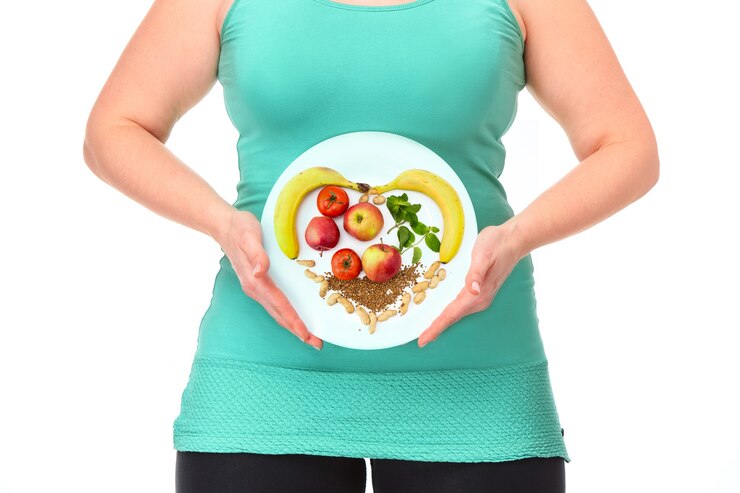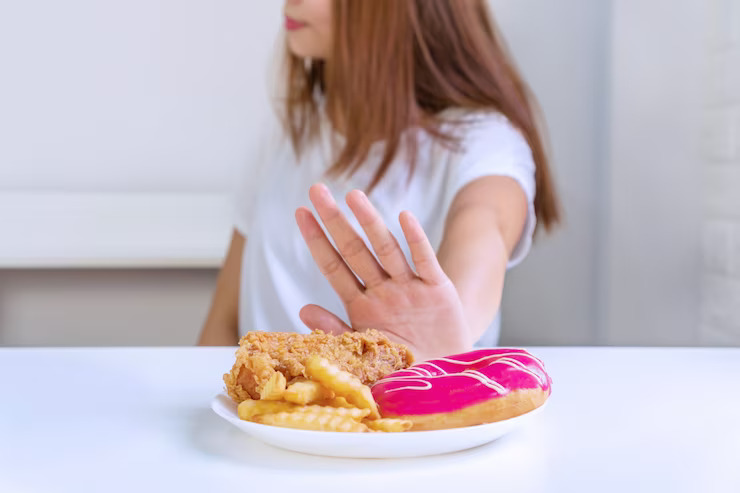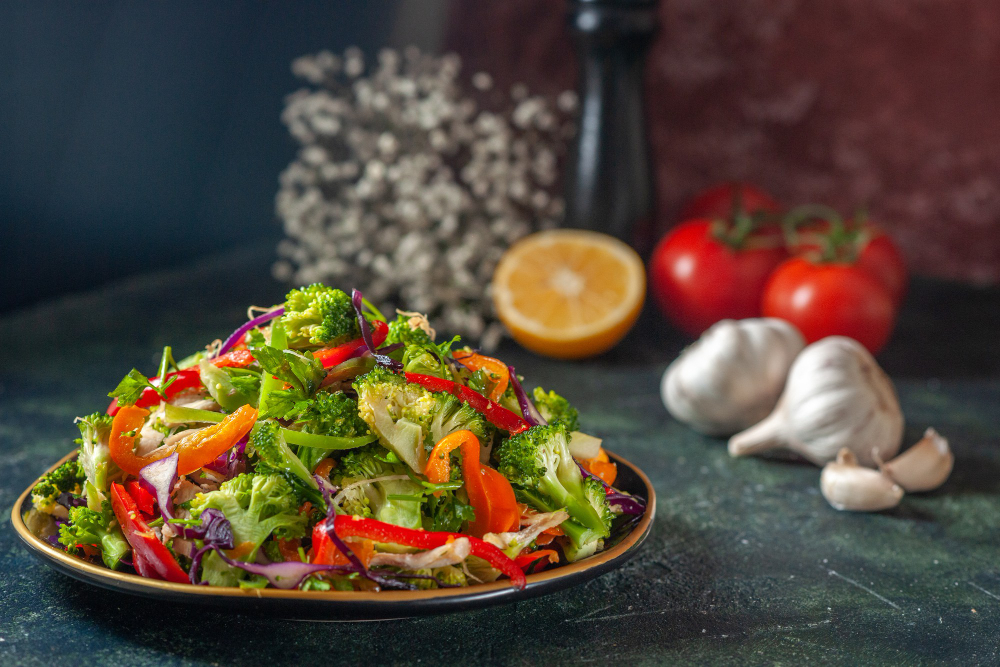

In maintaining a healthy body, one aspect that often takes a back seat is the health of our gallbladder. However, it can be prone to certain conditions, including gallstones.
Gallstones are solid particles that can form in the gallbladder, causing discomfort and pain. Your diet can indeed make a significant difference if you're dealing with gallstones or looking to prevent them. In this blog, we'll explore the Gall Stones Diet: Foods to Eat and Avoid.
So, let's get started!
Gallstones: The Basics!
Gallstones are crystalline deposits that develop in the gallbladder. These stones can vary in size and composition, with some being as small as a grain of sand and others as large as a golf ball. They can be primarily composed of cholesterol, bilirubin, or both.
Gallstones can be asymptomatic, meaning you might not even know their presence. However, when a gallstone becomes lodged in a duct or causes other complications, it can lead to excruciating pain, nausea, and even infection. Factors contributing to gallstone formation include genetics, obesity, rapid weight loss, and certain medical conditions.
Gall Stones Diet: Foods to Eat!
Now that we've covered the basics let's focus on the dietary aspects that can support gallstone management and prevention.

1. High-fiber Foods
Fiber is a cornerstone of a gallstone-friendly diet. It indeed plays a vital role in maintaining digestive health and can help prevent the accumulation of cholesterol in the gallbladder. Including a variety of high-fiber foods in your meals is a wise choice. Here's a breakdown of some fiber-rich options:
- Whole Grains - Whole grains such as brown rice, quinoa, whole wheat pasta, and oats are excellent choices. They are rich in fiber and provide essential nutrients that support overall health.
- Fruits - Fruits like apples, pears, and berries are high in fiber. They can be enjoyed fresh, in smoothies, or as toppings for yogurt and cereal.
- Legumes - Beans, lentils, and chickpeas are not only rich in fiber but also offer plant-based protein, making them an ideal addition to your gallstone-friendly diet.
2. Lean Proteins
Proteins are essential for your body, but when dealing with gallstones, it's crucial to choose lean sources. These options are lower in saturated fats, which can indeed help reduce the risk of gallstone formation. Here are some recommendations:
- Poultry - Skinless chicken and turkey are lean sources of protein. They can indeed be prepared in various ways, such as grilling, baking, or stir-frying.
- Fish - Fatty fish like salmon, mackerel, and trout are not only excellent sources of protein but also provide essential omega-3 fatty acids, which have anti-inflammatory properties.
- Tofu - Tofu is a versatile and protein-rich option for vegetarians and vegans. It can indeed be used in various dishes, from stir-fries to smoothies.
3. Healthy Fats
While limiting overall fat intake is crucial, choosing healthy fats for gallstone management is equally important. Healthy fats can help reduce the workload of your gallbladder and promote overall gallbladder health. Here are some examples:
- Avocados - Avocados are a nutrient-dense source of healthy monounsaturated fats. They can be sliced and added to salads, mashed for guacamole, or used as a creamy sandwich spread.
- Nuts - Almonds, walnuts, and pistachios are packed with healthy fats, vitamins, and minerals. Get a handful of mixed nuts as a satisfying and heart-healthy snack.
- Olive Oil - Extra-virgin olive oil is indeed a staple in Mediterranean cuisine and provides healthy monounsaturated fats. It's perfect for drizzling on salads or using as a cooking oil.
4. Water
Hydration is a fundamental aspect of preventing gallstones. When you stay well-hydrated, it helps to keep the bile in your gallbladder from becoming too concentrated. Aim to drink at least 7-8 glasses of water daily to support your overall digestive health. You can indeed also include herbal teas and infused water for variety.
5. Coffee
Believe it or not, moderate coffee consumption has been associated with a reduced risk of gallstone formation. While the exact reasons behind this association aren't fully understood, enjoying a cup or two of your favorite brew can be a part of your gallstone-friendly diet. However, it's vital not to overdo it, as excessive caffeine intake can lead to other health issues.
6. Calcium-rich Foods
Including calcium-rich foods in your diet can be beneficial for gallstone prevention. Calcium helps regulate fat metabolism, reducing the risk of stone formation. Here are some options:
- Low-fat Dairy Products - Opt for low-fat or fat-free versions of milk, yogurt, and cheese to get your calcium without the added saturated fat.
- Leafy Greens - Vegetables like kale, collard greens, and bok choy are not only rich in calcium but also provide a host of other essential nutrients.
7. Vitamin C
Vitamin C has indeed been linked to a lower risk of gallstone formation. It may help by reducing the cholesterol content in bile. To boost your vitamin C intake, consider including the following foods in your diet:
- Citrus Fruits - Oranges, lemons, and grapefruits are well-known for their high vitamin C content. Enjoy them as fresh fruit or in freshly squeezed juices.
- Bell Peppers - Red, green, and yellow bell peppers contain vitamin C. They can indeed be enjoyed raw in salads or as crunchy dish additions.
Incorporating these dietary recommendations into your daily meals can go a long way in managing gallstones and supporting gallbladder health. Remember that a balanced diet and other healthy lifestyle choices are critical to promoting overall well-being.
Foods for gallstones: Gall Stones Diet: Foods to Avoid!
Equally important as knowing what to eat is understanding what foods to avoid when dealing with or trying to prevent gallstones.

1. High-Fat Foods
Steer clear of high-fat foods like fried dishes, and full-fat dairy products. Excess fat can trigger the gallbladder to release bile, possibly contributing to stone formation.
2. Refined Sugars
Sugary foods and beverages can indeed lead to weight gain, increasing the risk of gallstone development. Minimize your intake of candies, sodas, and sugary snacks.
3. Red Meat
Red meat, mainly processed and fatty cuts, can raise cholesterol levels. Consuming red meat sparingly is best if you're concerned about gallstones.
4. Rapid Weight Loss Diets
Avoid crash diets or rapid weight loss plans, as these can disrupt the balance of bile in your gallbladder and increase the risk of stone formation.
5. Excessive Alcohol
While moderate alcohol consumption can not be harmful, excessive drinking can harm your gallbladder. Limit alcohol intake for better gallstone management.
Gallstone-friendly Recipes
To make following a gallstone-friendly diet easier, the following are a couple of delicious and healthy recipes you can try:

1. Grilled Lemon Herb Chicken
Marinate chicken breasts in a mixture of lemon juice, fresh herbs, and olive oil—grill to perfection for a lean and flavorful meal.
2. Quinoa and Roasted Vegetable Salad
Roast your favorite veggies and toss them with cooked quinoa. Drizzle with a light vinaigrette for a tasty, fiber-rich dish.
Conclusion
Incorporating a gallstone-friendly diet into your lifestyle can be a proactive step in managing gallstones or reducing your risk of developing them. Remember to focus on high-fiber, low-fat, and nutrient-rich foods while avoiding high-fat and sugary options. A balanced diet, combined with other healthy lifestyle choices, can go a long way in promoting gallbladder health.
Key Takeaways
- A gallstone-friendly diet includes high-fiber foods, lean proteins, and healthy fats.
- Stay hydrated with plenty of water and consider moderate coffee consumption.
- Avoid high-fat foods, refined sugars, and excessive alcohol.
- Be cautious of rapid weight loss diets and limit red meat consumption.
- Try gallstone-friendly recipes for a delicious and nutritious meal plan.
Also Read: Understanding Esophageal Cancer: Causes And Types – Healix Hospitals